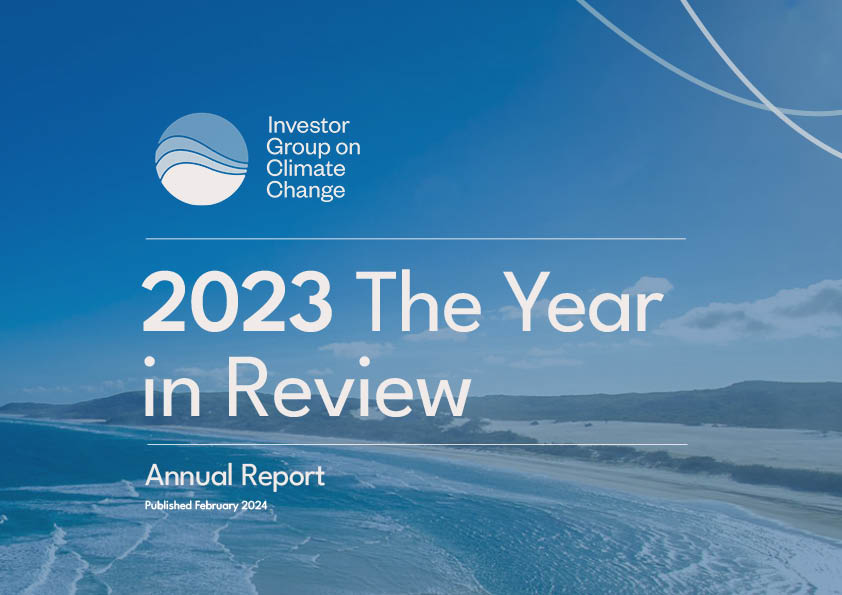IGCC Members Are Custodians of 14.8 Million Australians’ Investments: 2023 Annual Report
8 February 2024
The Investor Group on Climate Change has released its Annual Report for 2023, showing its work with members to mitigate climate risk and leverage the opportunities of the global transition to net zero.

Download the Full Report
IGCC members’ global AUM has reached A$35 trillion, and almost A$5 trillion locally, up from A$30 trillion and A$3 trillion in 2022 respectively.
Members now also represent more than 14.8 million beneficiaries, up from 8 million when last calculated four years ago.
IGCC’s expanded investor network helped to grow strong progress on climate action across 2023, particularly in advocating for policy settings that will support investment in new climate solutions.
It also saw more investors work on setting, refining, and implementing their net zero targets.
This Annual Report has been released near the mid-point of IGCC’s 2022-25 strategy demonstrating progress and impact across three key workstreams – Investor Practice, Corporate Engagement, and Policy & Advocacy. This year, IGCC also integrated the strategy’s two priority themes: physical risk and resilience and a just transition across its work.
Policy and Advocacy Highlights:
- The government has agreed to sector-by-sector policy plans to support an orderly and just transition to net zero emissions,
- Credible carbon pricing has been established for the industrial sector through the Safeguard Mechanism reform,
- Internationally aligned climate-related disclosures will start to be mandatory during 2024, helping investors effectively allocate capital across individual investment asset classes and meet regulatory and stakeholder expectations.
- The introduction of the Capacity Investment Scheme will help to fast-track investment in renewable energy into Australia’s grids.
- IGCC’s physical risk and just transition work also delivered policy impacts, outlined below.
Investor Practice Highlights:
- Preliminary results from the Annual State of Net Zero Survey provides excellent transparency on investors commitment and progress on climate action. It shows high levels of climate policies, and a notable increase in the proportion of investors with climate action plans.
- There was solid progress by local signatories of the Net Zero Asset Manager initiative (NZAM), with the IGCC team helping over a third of signatories in Australia and New Zealand develop targets.
- The team has worked to help members improve their engagement with regulators and internal stakeholders about how they are approaching the disclosure of investee Scope 3 emissions.
- A program of learning sessions was implemented to help members navigate the complexity of setting targets across certain asset classes, strengthening community of practice on investor portfolio-wide net zero efforts.
- A new report “Mobilising Climate Investment in Emerging Markets” – presented at COP28 in Dubai – was developed to support organisations seeking to promote investor support for climate action in developing economies.
Corporate Engagement Highlights:
- Phase 2 of Climate Action 100+ was launched, helping to scale up active ownership and thereby facilitate greater corporate climate action amongst Australia’s heaviest emitters. The initiative’s scope was also expanded to support investor-led engagement to address system-level sector and thematic barriers to corporate decarbonisation.
- “The Net Zero Standard for Diversified Mining” was launched, setting out detailed sector-specific metrics to assess mining company transition plans to net zero.
Physical Risk and Resilience Highlights:
- IGCC’s strategy to accelerate the flow of capital into climate adaptation and resilience, “Road to Resilience” was launched at IGCC’s Annual Summit by the Assistant Minister for Climate Change and Energy, Senator Jenny McAllister. The accompanying report provides four key areas of work for investors and our broader ecosystem to manage physical risks associated with climate change, address policy barriers, and facilitate investment in adaptation and resilience.
- IGCC contributed to shaping Australia’s National Climate Risk Assessment, with a focus on the financial implications of climate’s physical risks, helping ensure the government’s systemic risk mapping process can better guide policy towards a climate-resilient economy.
Just Transition Highlights:
- The government has committed to establish a national Net Zero Authority, which IGCC has advocated for, with the mandate helping workers, sectors, and communities that have powered Australia for generations to seize the opportunities of Australia’s net zero transformation, and work with investors on the transition.
- A new report “Investing in Australia’s Vital Regions” gathered intelligence from investors, businesses, and regional experts to make recommendations on how to support greater investment in the regions that will need to develop new green industries.
Financial Report Overview:
- Expenses remained consistent with budget and in line with revenue received, and relate largely to employee wages, professional services, operational costs, and project-specific expenses.
- A surplus of $252, 676 was achieved for the year, contributing to improved organisational resilience for the future.
This year will be a critical year for Australia, with pivotal five-year policy decisions — including Australia’s 2035 emissions target — fast approaching. The achievements attained by IGCC and its members across the past year will help to lay the foundations to support these decisions, and facilitate investment in a rapid, just, and orderly transition for communities and the economy.
Download the Full Report
A Message from our CEO, Rebecca Mikula-Wright:
“IGCC’s work is supported by membership fees as well as by contributions from partners, foundations, and supporters.
We would like to thank these organisations for their invaluable support across 2023, which has enabled us to make tangible, real-world outcomes across our key strategic areas on a local level and advance our co-led global programs in collaboration with our international peers.”